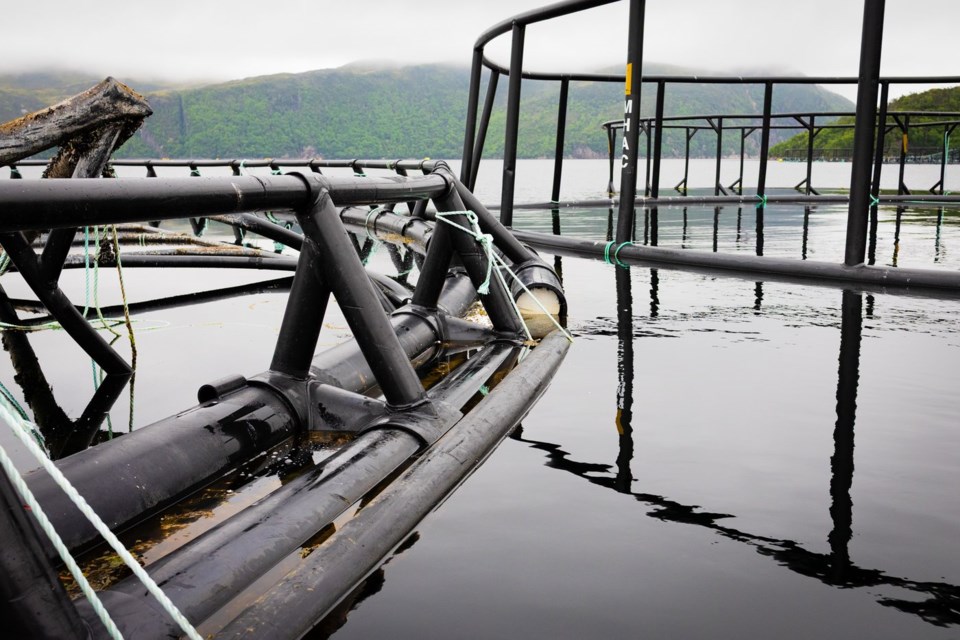ST. JOHN'S — An eastern Canadian conservation group is calling for a moratorium on aquaculture expansion in Newfoundland and Labrador, alleging fish-farming companies are stashing plastic garbage along the province's remote southern coastline.
In a report summary released Tuesday, the Atlantic Salmon Federation said satellite images suggest aquaculture companies appear to have left broken cages, rope and other detritus in six sites along Newfoundland's south coast.
The New Brunswick-based group is demanding the federal fisheries minister halt aquaculture expansion in the province until the companies get their waste under control, said spokesperson Neville Crabbe.
"Fix your problems, utilize your existing sites, optimize what you have," Crabbe said in an interview. "The industry is not going anywhere right now in Newfoundland and Labrador, but nor should it go anywhere else."
Newfoundland's south coast is known for its towering fiords and small communities dotting its shores, some of which are only accessible by boat or plane. The aquaculture industry is a valued source of jobs in the area.
The Atlantic Salmon Federation has been monitoring aquaculture waste in the region for more than a year. Crabbe said the federation is not calling for the companies to shut down or cut jobs.
In its latest investigation, the federation worked with Planetixx, a U.K.-based climate data and analytics firm. The team used more than 60,000 satellite images of the area, spanning more than a decade, to train an artificial intelligence model to recognize sea cage rings — the frames that support large nets inside which salmon is farmed.
The AI model could then identify sites with abnormalities, such as misshapen rings or haphazard arrangements. When the AI identified a site with anomalies, the researchers viewed high-definition images of the area from Maxar Technologies' satellite constellations.
Through this process, they identified six sites they allege were dumping grounds for "broken, degraded salmon farm equipment," the report said.
They found no equipment at any time between March 2020 to May 2025 in half of the 106 licensed sites analyzed, indicating the areas were inactive. For Crabbe, that suggests the companies don't need to expand into other areas.
Last year, members of the federation visited a cove known locally as The Locker, near Gaultois, N.L., and captured images of discarded plastic bags, blue barrels, rope, buoys and old sea cages. Crabbe said the province ordered companies operating in the area to clean it up earlier this year, though the provincial Fisheries Department did not respond to a request for information about the order.
He flew over the site in a helicopter in February and saw the debris had been cleared. But when he returned last month by boat, it was once again full of trash, he said. A remotely operated vehicle took images of a sea cage and netting sunken beneath the water.
"The buoyant structure appears to be anchored to the sea floor, unable to float up, potentially indicating a deliberate sinking," the federation's report summary on Tuesday said.
They also found garbage at a site in nearby Roti Bay, Crabbe said.
"It's very clear in their licences, and in the regulations governing the industry, that they have to have waste management plans," he said. "The discovery of that sunken cage in the locker, at the very least, should compel authorities to go and survey these areas to see what else is under the water."
In a news release Monday, the Newfoundland Aquaculture Industry Association said the provincial regulator allows companies to store unused equipment, including sea cages, in leased marine areas before they are dismantled and recycled.
"Plastic sea cages may be held at leased sites until vessel and staff resources are available to safely transport them to shore-based yards and recycling facilities," the release said.
Abandoned sites operated by different owners under different rules "have been and are being addressed," it said.
This report by The Canadian Press was first published July 8, 2025.
Sarah Smellie, The Canadian Press



